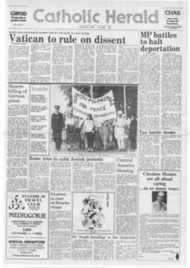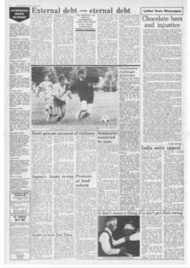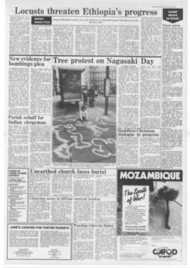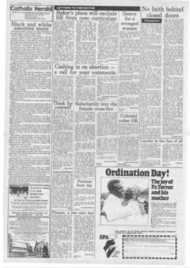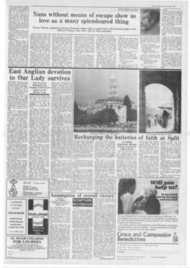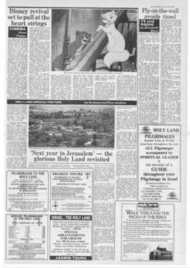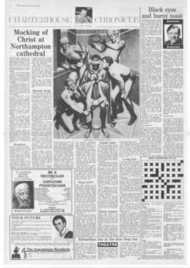Page 1, 14th August 1987
Page 1
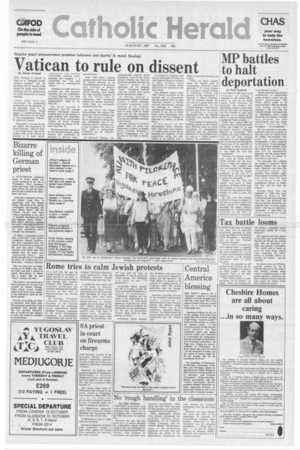
Report an error
Noticed an error on this page?If you've noticed an error in this article please click here to report it.
Tags
Share
Related articles
The Word Of God
Moral Dilemmas In Seminaries
Curran's Ban Ends Dissent
Pope Hits Back At Theologians
New Instruction Condemns Public Protests Of Groups Of...
Vatican to rule on dissent
By Martin Newland THE Vatican is poised to react to a "changed socialcultural context" and the growing tide of dissent from within its ranks over ethical teaching with the publication of a new document on moral theology.
Pope John Paul has announced the impending publication of the document in an apostolic letter to the Redemptorist Order, dated August 1, commemorating the 200th anniversary of the death of the congregation's founder, St Alphonsus.Ligouri.
"Especially in our age no one can ignore the importance of moral theology," said the Pope in the 12-page letter. One of the modern roles of the Church he stressed, is to make people rediscover the correct relationship between truth, goodness and freedom — a relationship that "has been largely lost in contemporary culture."
"Dealing in a wider and more profound way with questions regarding the very foundations of moral theology," the Pope said will be the "contribution of enlightenment" made by the Holy See.
The letter praised St Alphonsus and his attitude towards theological research, dwelling more on his defence of papal primacy and infallibility than on his lively, questionning writings on moral theology which earned the censure of the then Pope Pius VI.
"He had particular veneration for the Supreme Pontiff, whose primacy and infallibility he defended in difficult times," said the Pope.
Pope John Paul's surprise announcement has been greeted by Vatican observers as an acknowledgement of his concern over criticisms of Rome's intolerance of dissent from official teaching. Such dissent has been especially apparent in the US, which, like St Alphonsus, rests theological method on human experience rather than on universally accepted moral laws.
In the letter the Pope acknowledged that modern life poses new moral problems that are "often not easy to resolve," but he reasserted the official line that individually and in the teaching ministry Catholics have a duty to follow "the Word of God, which is authentically interpreted by the Church's magisterium."
internationally reputed moral theologian, wrote in the Jesuit journal America that there are significant parallels between the "rigorist" attacks on St Alphonsus for his allegedly "laxist" theological methods "and the current crisis facing moral theologicans today."
Fr Haring, himself a Redemptorist, taught Fr Charles Curran, a moral theology professor suspended from teaching at the Catholic University of America for his views in some fields of sexual ethics and for his contention that it is permissable to dissent from the non-infallible teachings of the Church.
He even acted as Fr Curran's counsel when the latter was summoned to Rome to appear before Cardinal Ratzinger's Sacred Congregation for the Doctrine of the Faith in March 1986.
It is hoped by onlookers that the new document will allow for some pastoral leeway to be given to those Catholics whose dispositions at present disbar them from full communion with the Church.
The allegedly rigorist tenor 1986 Vatican encyclical on the pastoral care of homosexuals and the reported drive in some American dioceses to further ostracise homosexuals through the banning of "Dignity" meetings and liturgies on church premises is one area in which many moral theologians have seen fit to call for a change of approach to aspects of sexual ethics.
In his letter to the Redemptorist Order, however, Pope John Paul gave evidence of a need to take a softer line in imposing the teachings of the magisterium saying that they needed to be applied with a degree of pastoral tolerance and charity.
"There are major disputes about the method used in approaching universal moral questions," Fr Gerry Hughes SJ, a lecturer in moral theology at Heythrop College and member of the Association of Teachers of Moral Theology, told the Catholic Herald. He was one of a group which met with representatives of the Catholic Bishops' Conference of England and Wales last month to establish a working relationship with the English hierarchy over current ethical questions.
"It is a matter of concern that different people in the Church have differing views on moral approaches to contemporary questions and any document addressed to this problem must be seen as a highly positive venture," he commented.
blog comments powered by Disqus


